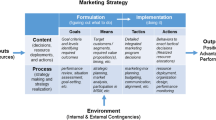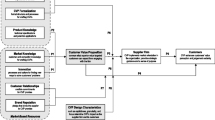Abstract
The purpose of this research is to examine the impact of individual and firm moral philosophies on marketing exchange relationships. Personal moral philosophies range from the extreme forms of true altruists and true egoists, along with three hybrids that represent middle ground (i.e., realistic altruists, tit-for-tats, and realistic egoists). Organizational postures are defined as Ethical Paradigm, Unethical Paradigm, and Neutral Paradigm, which result in changes to personal moral philosophies and company and industry performance. The study context is a simulation of an exchange environment using a variation of the prisoners’ dilemma game. A literature review is provided in the opening section, followed by details on the simulation, discussion of the results, and the implications for theory and practice.
Similar content being viewed by others
References
R. Axelrod W. D. Hamilton (1981) ArticleTitle‘The Evolution of Cooperation’ Science 211 1390–1396
R. Axelrod (1984) The Evolution of Cooperation Basic Books, Inc. New York
A. Bazzan R. Bordini J. Campbell (2002) ‘Evolving Agents with Moral Sentiments in an Iterated Prisoner’s Dilemma Exercise’ S. Parsons P. Gmytrasiewicz M. Wooldridge (Eds) Game Theory and Decision Theory in Agent-Based Systems Kluwer Academic Publishers Boston 43–64
J. A. Bellizzi R. W. Hasty (2003) ArticleTitle‘Supervising Unethical Sales Force Behavior: How Strong is the Tendency to Treat Top Sales Performers Leniently?’ Journal of Business Ethics 43 IssueIDApril 337–351
J. A. Bellizzi R. E. Hite (1989) ArticleTitle‘Supervising Unethical Sales Force Behavior’ Journal of Marketing 53 IssueIDApril 36–47
J. Brinkmann (2002) ArticleTitle‘Business and Marketing Ethics: Concepts, Approaches and Typologies’ Journal of Business Ethics 41 IssueIDNovember/December 159–177
B. Bruce C. U. Stephens (1998) ArticleTitle‘Objections to an Objectivist Approach to Integrity’ Academy of Management Review 23 IssueIDJanuary 162–169
J. B. DeConinck (1992) ArticleTitle‘How Sales Managers Control Unethical Sales Force Behavior’ Journal of Business Ethics 11 IssueIDOctober 789–798
Dubinsky, A. J.: 1998, ‘A Research Odyssey in Sales Management’, Academy of Science Review, 1998 (10), 1–7
O. C. Ferrell L. G. Gresham (1985) ArticleTitle‘A Contingency Framework for Understanding Ethical Decision Making in Marketing’ Journal of Marketing 49 IssueIDSummer 87–96
E. Gick (2003) ArticleTitle‘Cognitive Theory and Moral Behavior: The Contribution of F.. A. Hayek to Business Ethics’ Journal of Business Ethics 45 IssueIDJune 149–165
J. R. Goolsby S. D. Hunt (1992) ArticleTitle‘Cognitive Moral Development and Marketing’ Journal of Marketing 56 IssueIDJanuary 55–68
J. M. Grcic (1985) ArticleTitle‘Democratic Capitalism: Developing a Conscience for the Corporation’ Journal of Business Ethics 4 IssueIDApril 145–150
J. M. Guttman (2003) ArticleTitle‘Repeated Interaction and the Evolution of Preferences for Reciprocity’ The Economic Journal 113 IssueIDJuly 631–656
R. P. Hill (2002) ArticleTitle‘Compassionate Love, Agape, and Altruism: A New Framework for Understanding and Supporting Impoverished Consumers’ Journal of Macromarketing 22 IssueIDJune 19–31
R. P. Hill D. L. Stephens I. Smith (2003) ArticleTitle‘Corporate Social Responsibility: An Examination of Individual Firm Behavior’ Business and Society Review 108 IssueIDSeptember 339–362
F. N. Ho S. J. Vitell J. H. Barnes R. Desborde (1997) ArticleTitle‘Ethical Correlates of Role Conflict and Ambiguity in Marketing: The Mediating Role of Cognitive Moral Development’ Journal of the Academy of Marketing Science 25 IssueIDSpring 117–126
S. D. Hunt S. J. Vitell (1986) ArticleTitle‘A General Theory of Marketing Ethics’ Journal of Macromarketing 6 IssueIDSpring 5–16
P. C. Kelley D. R. Elm (2003) ArticleTitle‘The Effect of Context on Moral Intensity of Ethical Issues: Revising Jones’s Issue-Contingent Model’ Journal of Business Ethics 48 IssueIDDecember 139–154
S. Klein (2003) ArticleTitle‘The Natural Roots of Capitalism and Its Virtues and Values’ Journal of Business Ethics 45 IssueIDJuly 387–401
N. B. Kurland (1995) ArticleTitle‘Ethics, Incentives, and Conflicts of Interest: A Practical Solution’ Journal of Business Ethics 14 IssueID6 465–475 Occurrence Handle10.1007/BF00872087
G. Oakes (1991) ArticleTitle‘The Sales Process and the Paradoxes of Trust’ Journal of Business Ethics 9 IssueIDSeptember 671–679
E. J. O’Boyle L. E. Dawson (1992) ArticleTitle‘The American Marketing Association Code of Ethics: Instructions for Authors’ Journal of Business Ethics 11 IssueIDDecember 921–932
L. V. Ryan M. Ciavarella (2002) ArticleTitle‘Tapping the Source of Moral Approbation: The Moral Referent Group’ Journal of Business Ethics 38 IssueIDJune 179–192
D. J. Schroeder (2000) ArticleTitle‘Morality De-Kanted or the Biological Roots of Moral Behavior’ International Journal of Values-Based Management 13 IssueID3 297–308
A. Singhapakdi S. J. Vitell (1991) ArticleTitle‘Analyzing the␣Ethical Decision Making of Sales Professionals’ Journal of Personal Selling and Sales Management XI IssueID4Fall 1–2
A. Singhapakdi S. J. Vitell G. R. Franke (1999) ArticleTitle‘Antecedents, Consequences, and Mediating Effects of Perceived Moral Intensity and Personal Moral Philosophies’ Journal of the Academy of Marketing Science 27 IssueIDWinter 19–36
J. Snider R. P. Hill D. Martin (2003) ArticleTitle‘Corporate Social Responsibility in the 21st Century: A View from the World’s Most Successful Firms’ Journal of Business Ethics 48 IssueIDDecember 175–187
M. C. Sommers (1997) ArticleTitle‘Useful Friendships: A Foundation for Business Ethics’ Journal of Business Ethics 16 IssueIDSeptember 1453–1458
B. Stedron (2004) ArticleTitle‘Forecasts for Artificial Intelligence’ Futurist 38 IssueID2 24–25
L. K. Trevino (1986) ArticleTitle‘Ethical Decision Making in Organizations: A Person-Situation Interactionist Model’ Academy of Management Review 11 IssueID3 601–617
S. Valentine T. Barnett (2002) ArticleTitle‘Ethics Codes and Sales Professionals’ Perceptions of Their Organizations Ethical Values’ Journal of Business Ethics 40 IssueIDOctober 191–200
T. R. Wotruba (1990) ArticleTitle‘A Comprehensive Framework for the Analysis of Ethical Behavior, With a Focus on Sales Organizations’ Journal of Personal Selling and Sales Management 10 IssueID2 29–42
M. Wright (1995) ArticleTitle‘Can Moral Judgment and Ethical Behaviour Be Learned? A Review of the Literature’ Management Decision 33 IssueID10 17–28 Occurrence Handle10.1108/00251749510100212
Author information
Authors and Affiliations
Corresponding author
Rights and permissions
About this article
Cite this article
Watkins, A., Hill, R.P. ‘The Impact of Personal and Organizational Moral Philosophies on Marketing Exchange Relationships: A Simulation Using the Prisoner’s Dilemma Game’. J Bus Ethics 62, 253–265 (2005). https://doi.org/10.1007/s10551-005-8714-9
Issue Date:
DOI: https://doi.org/10.1007/s10551-005-8714-9




